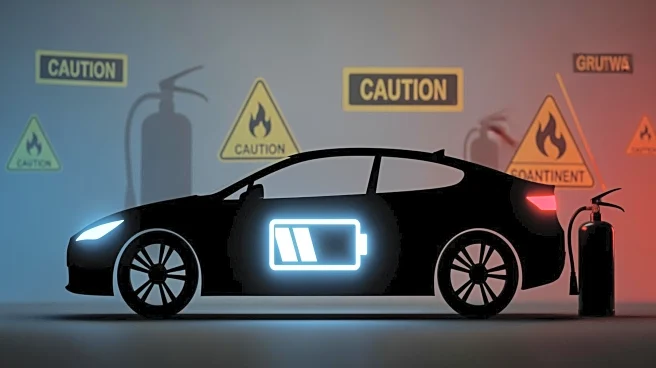What's Happening?
Chrysler, owned by Stellantis, is recalling over 320,000 Jeep plug-in hybrid vehicles due to a faulty battery that poses a fire risk. The recall affects 228,221 Jeep Wranglers from model years 2020-2025 and 91,844 Jeep Grand Cherokees from model years 2022-2026.
The National Highway and Traffic Safety Administration (NHTSA) has advised owners to park these vehicles outside and away from structures and to refrain from charging them until a solution is found. Chrysler has reported 19 incidents and one injury potentially linked to the battery issue. Interim notification letters will be sent to vehicle owners by December 2, 2025, with further communication once a final remedy is available.
Why It's Important?
The recall highlights significant safety concerns for owners of affected Jeep plug-in hybrids, potentially impacting consumer trust in Chrysler's hybrid technology. The issue underscores the importance of rigorous safety standards in the automotive industry, especially as electric and hybrid vehicles become more prevalent. The recall could lead to financial implications for Chrysler, including costs associated with repairs and potential loss of sales. Additionally, it may influence public perception of hybrid vehicles' reliability, affecting broader market adoption of eco-friendly automotive technologies.
What's Next?
Chrysler is expected to develop a remedy for the faulty battery issue, with vehicle owners receiving interim notifications by December 2, 2025. The NHTSA will provide searchable Vehicle Identification Numbers for the recall starting November 6, 2025. Chrysler's customer service is available for inquiries, and further communication will follow once a solution is finalized. The automotive industry and consumers will be closely monitoring Chrysler's response to ensure safety and restore confidence in their hybrid models.
Beyond the Headlines
This recall may prompt broader discussions on the safety and reliability of hybrid and electric vehicle technologies. It could lead to increased scrutiny of battery manufacturing processes and quality control measures. The incident may also influence regulatory policies concerning vehicle safety standards, potentially resulting in stricter guidelines for battery components in hybrid and electric vehicles.

















